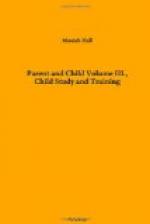For further study, selections from “Elementary Psychology,” by Phillips, will be found helpful.
POSITIVE VS. NEGATIVE TRAINING
Train the Positive Side of the Child’s Nature and the Negative Side Will Need Little Attention.
A negative method trains the child to be hard and critical, and to be constantly looking for opposition to his wishes; it is the chief cause also of slyness, ill-temper and disrespect.
The following illustrations are taken from Mrs. Harrison’s inspiring little book, entitled, “A Study of Child Nature.” “A mother came to me in utter discouragement, saying: ’What shall I do with my five-year-old boy? He is simply the personification of the word won’t.’ After the conversation I walked home with her. A beautiful child, with golden curls and great, dancing, black eyes, came running out to meet us, and with all the impulsive joy of childhood threw his arms about her. ’Don’t do that, James, you will muss mama’s dress.’ I knew at once where the trouble lay. In a moment she said: ‘Don’t twist so, my son;’ and ‘Don’t make such a noise.’ Within a few minutes the mother had used ‘don’t’ five times. No wonder when she said, ‘Run in the house now, mama will come in a minute,’ he replied: ‘No, I don’t want to.’”
“Two older children were playing in a room and soon became boisterous. The busy mother did not notice them, but the little two-year-old child turned round and called out impatiently: ’Boys, ‘top.’ Babies, like parrots, learn the words they hear most frequently. ‘Boys, stop,’ a negative command, had no doubt been used frequently in that household. How easy it would have been to substitute the positive statement: ’Boys, run out in the back yard and play ball,’ or ’Run out into the garden and bring me some flowers for the table.’
“A four-year-old boy when he first entered the kindergarten was the most complete embodiment of negative training I have ever met. It was ’No, I don’t want to,’ ‘No, I won’t sit by that boy,’ ‘No, I don’t like blocks.’ Nothing pleased him; nothing satisfied him. He was already an isolated character, unhappy himself and a source of discomfort to others. Soon after beginning our work, I heard a whizzing sound, and Paul’s voice crying out: ‘Joseph has knocked my soldier off the table and he did it on purpose too.’ My first impulse was to say: ’Why did you do that? It was naughty. Go and pick up Paul’s soldier.’ But that would have been negative treatment, too much of which had been heaped upon him already; so, instead, I said: ’Oh, well, Paul, never mind, Joseph doesn’t know that we try to make each other happy in kindergarten.’




